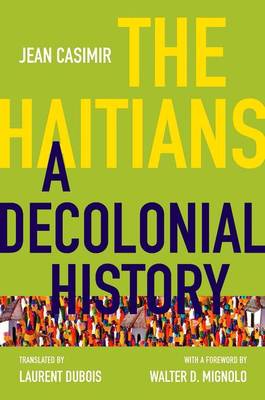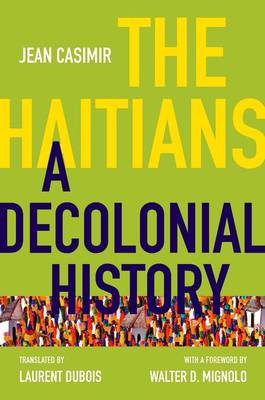
Door een staking bij bpost kan je online bestelling op dit moment iets langer onderweg zijn dan voorzien. Dringend iets nodig? Onze winkels ontvangen jou met open armen!
- Afhalen na 1 uur in een winkel met voorraad
- Gratis thuislevering in België vanaf € 30
- Ruim aanbod met 7 miljoen producten
Door een staking bij bpost kan je online bestelling op dit moment iets langer onderweg zijn dan voorzien. Dringend iets nodig? Onze winkels ontvangen jou met open armen!
- Afhalen na 1 uur in een winkel met voorraad
- Gratis thuislevering in België vanaf € 30
- Ruim aanbod met 7 miljoen producten
Zoeken
Omschrijving
In this sweeping history, leading Haitian intellectual Jean Casimir argues that the story of Haiti should not begin with the usual image of Saint-Domingue as the richest colony of the eighteenth century. Rather, it begins with a reconstruction of how individuals from Africa, in the midst of the golden age of imperialism, created a sovereign society based on political imagination and a radical rejection of the colonial order, persisting even through the U.S. occupation in 1915.
The Haitians also critically retheorizes the very nature of slavery, colonialism, and sovereignty. Here, Casimir centers the perspectives of Haiti's moun andeyo--the largely African-descended rural peasantry. Asking how these systematically marginalized and silenced people survived in the face of almost complete political disenfranchisement, Casimir identifies what he calls a counter-plantation system. Derived from Caribbean political and cultural practices, the counter-plantation encompassed consistent reliance on small-scale landholding. Casimir shows how lakou, small plots of land often inhabited by generations of the same family, were and continue to be sites of resistance even in the face of structural disadvantages originating in colonial times, some of which continue to be maintained by the Haitian government with support from outside powers.
The Haitians also critically retheorizes the very nature of slavery, colonialism, and sovereignty. Here, Casimir centers the perspectives of Haiti's moun andeyo--the largely African-descended rural peasantry. Asking how these systematically marginalized and silenced people survived in the face of almost complete political disenfranchisement, Casimir identifies what he calls a counter-plantation system. Derived from Caribbean political and cultural practices, the counter-plantation encompassed consistent reliance on small-scale landholding. Casimir shows how lakou, small plots of land often inhabited by generations of the same family, were and continue to be sites of resistance even in the face of structural disadvantages originating in colonial times, some of which continue to be maintained by the Haitian government with support from outside powers.
Specificaties
Betrokkenen
- Auteur(s):
- Uitgeverij:
Inhoud
- Aantal bladzijden:
- 452
- Taal:
- Engels
- Reeks:
Eigenschappen
- Productcode (EAN):
- 9781469660486
- Verschijningsdatum:
- 19/10/2020
- Uitvoering:
- Paperback
- Formaat:
- Trade paperback (VS)
- Afmetingen:
- 156 mm x 234 mm
- Gewicht:
- 689 g

Alleen bij Standaard Boekhandel
+ 128 punten op je klantenkaart van Standaard Boekhandel
Beoordelingen
We publiceren alleen reviews die voldoen aan de voorwaarden voor reviews. Bekijk onze voorwaarden voor reviews.











